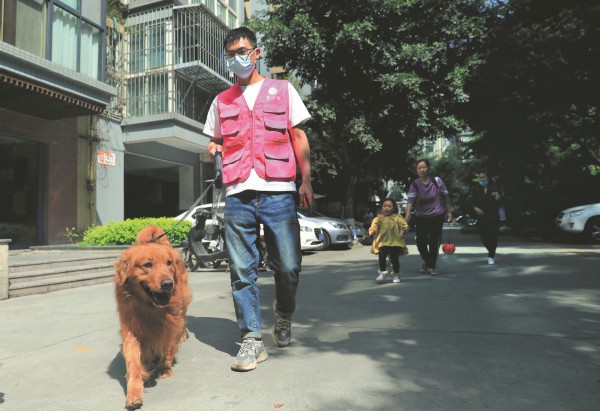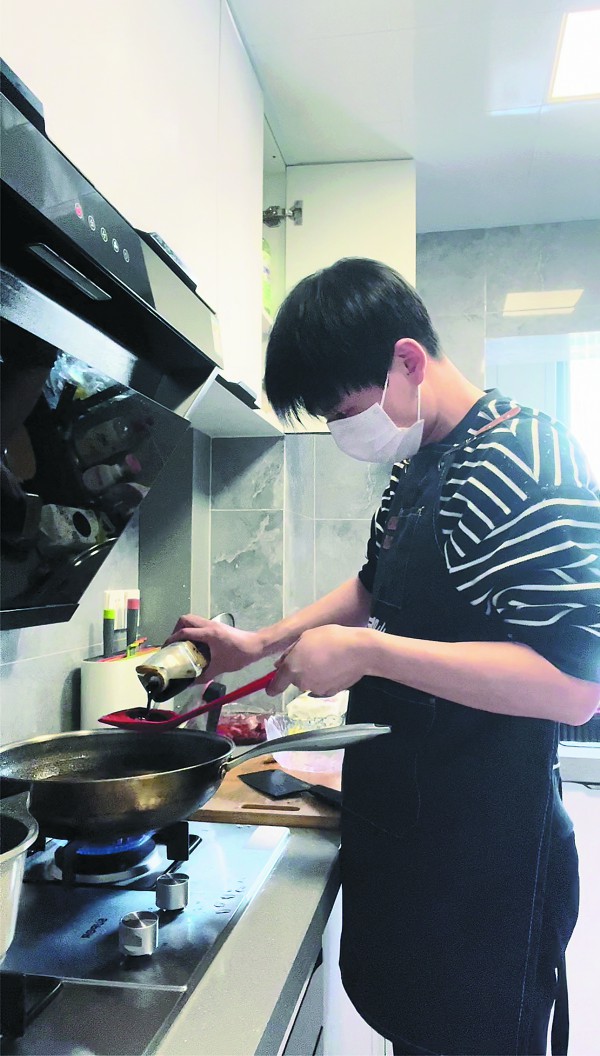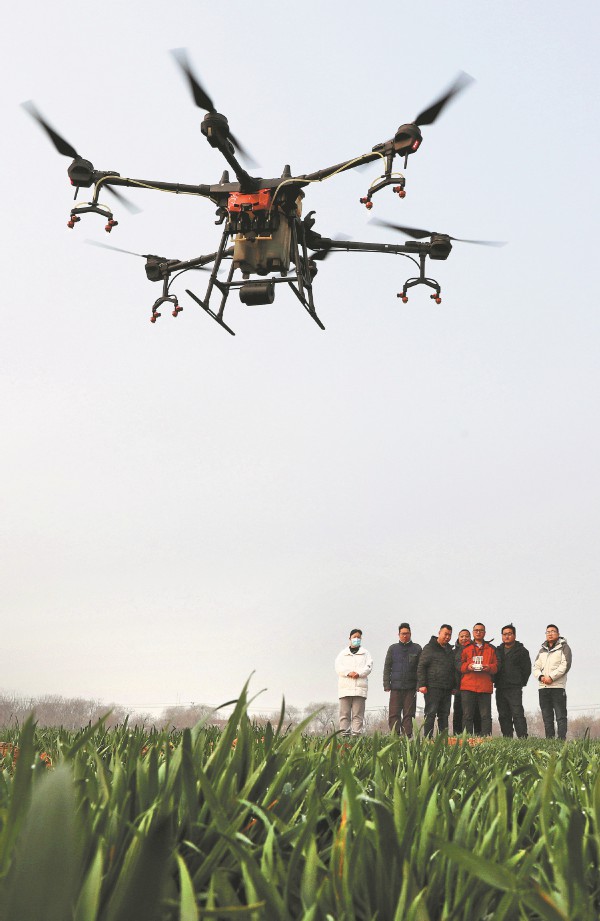
Chen Cong, a part-time "pet sitter", walks a golden retriever for a customer in Chengdu, Sichuan province, in March last year. [PHOTO/CHINA NEWS SERVICE]
Changing interests and needs have given rise to alternative professions
Cao Jiangnan, a graphic designer in Shanghai, started doing a part-time job — cooking for people at their homes — last November. "Many young people are tired of ordering takeouts, and just want to have a hearty home-made meal once in a while. This demand is surging, so the new occupation has become increasingly popular," the 26-year-old Cao said.
People's new interests and needs, in the new era, have led to the emergence of new occupations in niche areas of consumption in China. For example, room escape games popular with youngsters have incubated new professions, such as room escape game scriptwriting. The profession of hospital helpers, whose services include helping people to get an appointment with a doctor or fetching lab test results, has also emerged in recent times.
Most of the new occupations are favored by young people because they are more flexible, suit their interests, and provide a platform for them to pursue their dreams and adhere to their personal values.
Cao first came to know, through social media, about cooks/chefs making food for people at their homes last year. As someone who enjoys cooking, he believes it's a good opportunity to earn some extra money and meet new people during his free time, so he posted the first advertisement on providing in-home chef service on social media on Nov 1.
He provides the service only on weekends and public holidays. Also, his clients need to provide the ingredients needed for preparing the dishes of their choice. He charges 88 yuan ($12.76) for cooking up to four dishes and 168 yuan for preparing about 10 dishes. For dish-washing, people need to pay 20 yuan extra.
"I was surprised by the number of people who contacted me after the advertisement was posted. And they didn't mind that I am not a professional chef. In fact, they prefer an amateur because they just want to have earthy home-made food," Cao said.
Cao visited his first client's home on Nov 5 last year and made five dishes including braised pork in brown sauce, shrimp in garlic sauce and steamed fish for lunch.
"The family was really kind to me and I enjoyed cooking. They even invited me to join them for lunch. Actually, all my clients are polite and nice to me; they are glad that they can find someone to cook for them so conveniently," he said.
Part-time option
Cao then shared his experiences on social media. Besides making appointments, many have commented that they, too, are interested in taking up such a job, which is new to many.
Unlike traditional domestic service providers who are mainly middle-aged women, many who find such occupations appealing today are young people, Cao said. What's more, his clients are mainly young people, including young women living alone and young couples.
"Many of my clients live in Shanghai because they work there and are far away from home. They just want to have someone to cook for them; it gives them comfort and makes them feel as if they were at home with their loved ones," said Cao, who is from Jiangxi province.
"I've met many interesting people during the process, which means more to me than the extra income I make."
Security concerns are not an issue for him, he said, because he chooses to trust the strangers that he cooks for just like his clients find him trustworthy enough to invite him to their home.

Cao Jiangnan cooks at a client's home. [PHOTO/CHINA DAILY]
Cooking is a physically demanding and time-consuming job. Also, it takes time to commute to a client's home, so it's not an ideal full-time job. But for those who love to cook and are good at it, cooking for people at their home is a good part-time job option, Cao said.
"It's a good thing that more young people have started to provide in-home chef service, which is in high demand. As Chinese people's living standards continue to improve, more occupations may emerge in the future," Cao added.
In September 2022, China added 158 new professions to its list of recognized occupations since 2015, taking the total number of professions on the country's newly revised list to 1,639, the Ministry of Human Resources and Social Security said.
People's evident need for consumption upgrading, thanks to the continuous improvement in their living standards, has stimulated a batch of new occupations recognized by the ministry in recent years, including wardrobe organizers, healthcare providers, respiratory therapists and capacity assessors for the elderly.
Besides, the advances in digital technologies have fueled the platform economy, which in turn has given rise to delivery personnel for online orders, taxi-hailing service providers, and other new occupations.
"Maybe in-home chef service provider will be officially recognized (as an occupation) in the country one day," said Cao, who has taken two orders during the Labor Day holiday from a social media platform.
Working in pet industry
Furthermore, with the increase in pet ownership in China, the country's pet industry has seen rapid growth. From 2015 to 2023, pet consumption is expected to grow from 72.5 billion yuan ($10.51 billion) to an estimated 445.6 billion yuan, according to the 2021 White Paper on China's Pet Consumption Trends by iResearch Consulting Group, a Chinese market research firm offering consultancy services.
Accordingly, new occupations related to the pet industry have also emerged, veterinary weight loss trainer being just one of them.
Ye Pijing works as a veterinary physical therapist at a veterinary center in Shanghai.
She is also a veterinary weight loss trainer because she's also good at helping dogs lose weight, which an increasing number of dog owners today find necessary.
"Pet owners in China see their pets as family members and want them to live a healthy and long life. Like human beings, weight gain for pets can lead to many health problems including putting too much pressure on their joints. So weight loss programs for pets have become popular in China in recent years," Ye said.
At the Shanghai veterinary center, each dog has a customized weight-loss program. Ye uses different kinds of tools such as balance boards to force the dogs to use more of their muscles. "Most of the dogs quickly fall asleep after the first session of the program because it's very physically demanding," Ye said.
A client even traveled all the way from Beijing so Ye could help his six-year-old border collie lose weight and build up muscles after a joint replacement surgery, she said. After a month of training, the dog lost 1.2 kilograms and the muscles in its hind legs became stronger.
Moreover, the owner of an eight-year-old Alaskan malamute has been taking his dog to see Ye for weight loss for the past two years.
At the start of the weight loss program, the dog weighed 62.5 kg and had started to develop health problems. Now, it weighs about 47.6 kg and has become more active, Ye said. "People want the best for their pets and keeping them healthy is their priority."

Employees of an agricultural cooperative in Jiaozuo city, Henan province, learn how to operate a drone to spray pesticide on a farm with a professional drone operator on Feb 24. [PHOTO/XU HONGXING/FOR CHINA DAILY]
For better environment
Many other new occupations have emerged which can support China's high-quality sustainable development of production and better protect the environment.
For example, new professions that will help the county achieve the carbon peaking and carbon neutrality goals such as carbon emission administrators, carbon sequestration assessors, and energy efficiency and carbon-neutral building consultants are among the latest officially recognized occupations.
Ren Feng, director of the carbon asset management department at Ruichentai New Energy Company's branch in Chengdu, Sichuan province, said that since China published a plan in 2021 to ensure its carbon emissions peak before 2030 and it realizes carbon neutrality before 2060, the demand for carbon emission administrators has increased rapidly because many enterprises have to reduce their carbon emissions, such as power plants and steel manufacturers.
"By recognizing the new occupations, the authorities can formulate new vocational standards and guide training institutions to carry out training in accordance with the standards, so the assessment of carbon emissions and carbon sequestration can be more accurate, which is key to carbon trading," Ren said.
"Many enterprises have already created new departments to monitor carbon emissions and such specialists are in shortage."
Also, the inclusion of green occupations, mainly in such fields as ecological environment monitoring, environmental protection and governance, new energy production, and waste recovery and utilization, in the official list, will help more people, especially youths, to learn about the new occupations and possibly become interested in them, Ren added.
Hu Yujie, 32, is an associate professor at Guizhou University in Guiyang, Guizhou province.
She also works as a carbon sequestration assessor and uses carbon measurement methodologies to measure, audit and evaluate carbon sinks in forests, grasslands and other ecosystems.
"I once worked on a project that aimed to replace electricity with shallow geothermal energy for some daily household needs, in a bid to reduce carbon emissions due to the use of fossil fuel-generated electricity," Hu told Xinhua News Agency, and added that an "emissions reduction project like this can be put on the carbon trading market to share the cost of emissions reduction".





